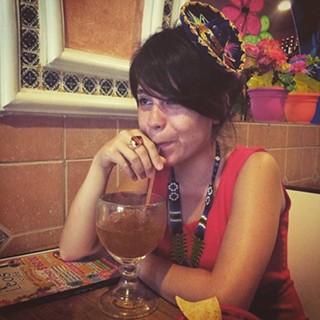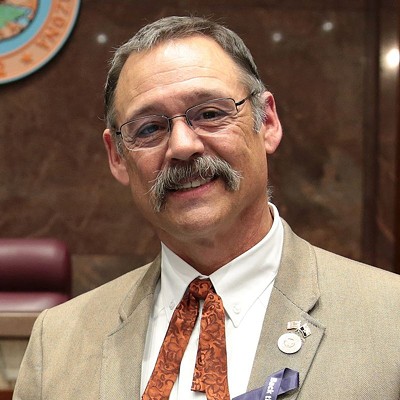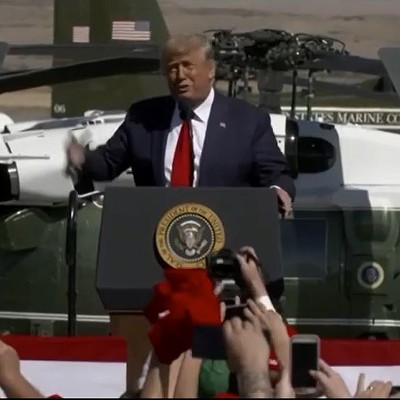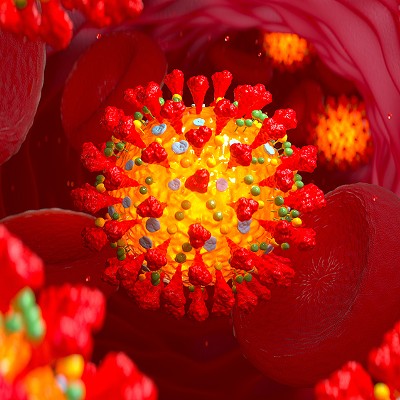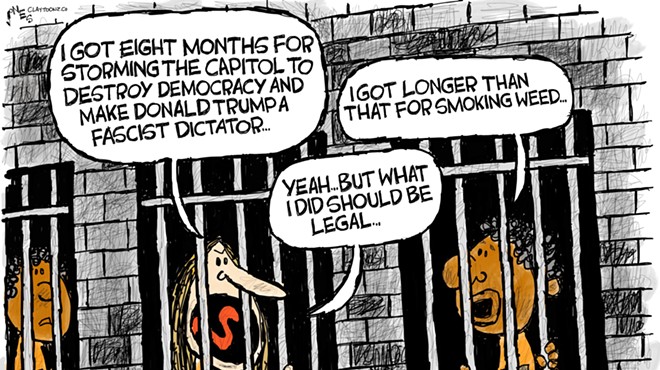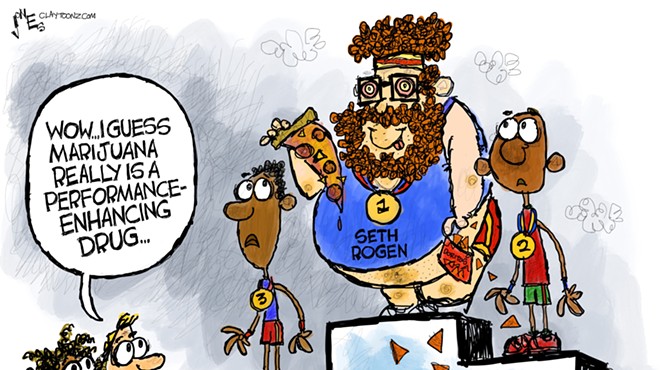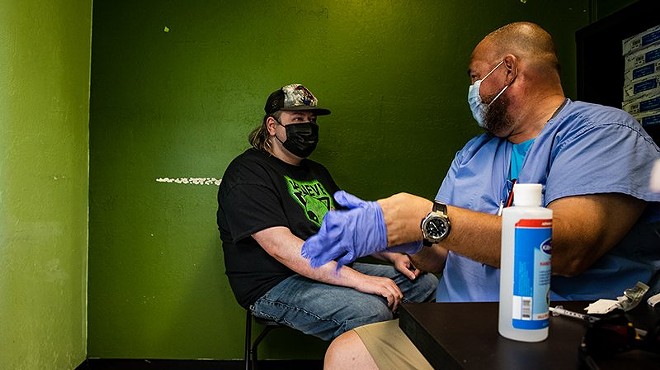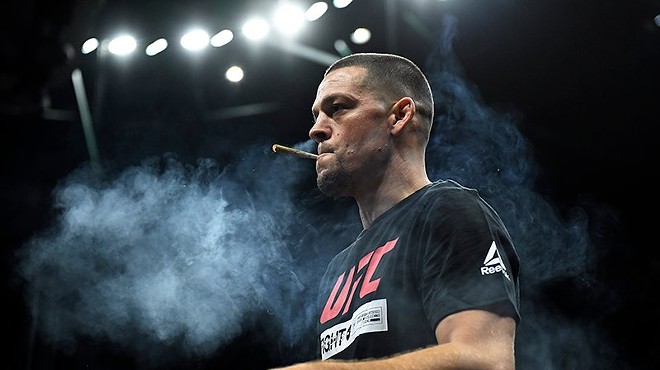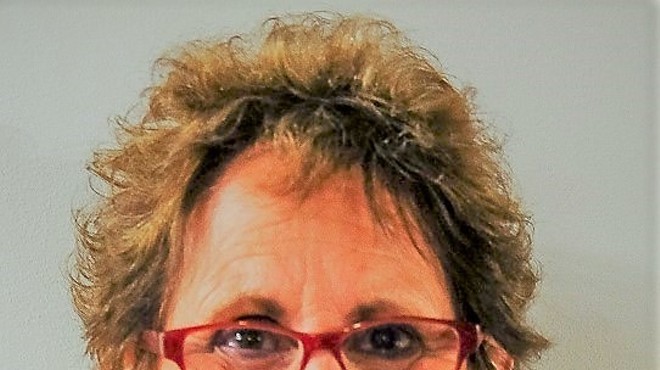Wednesday, October 21, 2015
In Defense of Marijuana: Medical Weed Patient & Caregiver Convicted on Drug Charges, Not Allowed to Cite MMJ Law
Kyle Catlin's family and friends have a lot of questions about the way his trial rolled out last week.
The biggest of them all: Why was Arizona's medical marijuana law pretty much ignored during most of the trial? Kyle's father, Marvin Catlin, is certain that if the defense would have been able to explain the statute, and how it pertained to Kyle's case, the jury wouldn't have convicted him on three felony drug charges. The 27-year-old is a medical marijuana patient and certified caregiver.
On Monday morning, Marvin watched the eight jurors read their unanimous decision, finding Kyle guilty of possessing marijuana for sale; attempting to produce marijuana; and possessing drug paraphernalia. Three felonies that could total two decades in prison if given the maximum.
Within 10 minutes, Kyle was taken into custody. He'll likely remain in jail until his sentencing hearing, which is scheduled for the beginning of December. His attorney, Brick Storts, wants him out on bail, but who knows.
Marvin stepped out of courtroom #478 that morning to call his wife. The mother of four wasn't able to get the day off work, and had to hear the news over the phone.
"(The jury) allowed for the law to be violated...ruined someone's life...put a perfectly fine man who harms no one (in jail)," Marvin says. "My wife is devastated. She is going to have a tough time."
A Glimpse into Trial for Case 1
(To freshen up your memory on details of Kyle's situation, read the story I wrote in September about his two cases.)
Last Tuesday after selecting the jury for Kyle's trial, Pima County Superior Court Judge Javier Chon-Lopez dictated that no one was allowed to research the Arizona Medical Marijuana Act (passed by voters in 2010), according to Storts. The defense couldn't ask witnesses questions related to the law, and the only times Storts was able to briefly mention the AMMA was during his opening and closing statements.
The only guideline explained was that an MMJ cardholder can possess up to 2.5 ounces of weed. Also, any word on Kyle's advocacy work with the group National Organization for the Reform of Marijuana Laws was prohibited.
At the end, Storts had no option but to rely on "beyond a reasonable doubt." When he directed the jury on the last day of trial, he said the state had failed to prove Kyle's guilt—that all the conclusions reached were unfounded assumptions.
First, there was the testimony by a young man—not a medical marijuana cardholder—who allegedly got weed from Kyle. Storts reminded the jury that the young man never confirmed he had gotten the marijuana from Kyle. (The man in question was reportedly seen leaving the apartment complex where Kyle consulted with other medical marijuana patients.) Prosecutor John Edgett, deputy county attorney at the Pima County Attorney's Office, argued it wasn't necessary to hear it from the young man's mouth—the circumstantial evidence pointed to Kyle selling him weed.
"(The young man) told me that he remembered everything except for things that implicated this defendant. You (jury) can understand why he doesn't want to get someone he is acquainted with in trouble," Edgett said in his closing statement.
(This young man's arrest was what backed up law enforcement agents' surveillance of Kyle, and the warrants to search both Kyle's place of business near Grant Road and First Avenue, and residency near Fourth Avenue, where they ended up finding 147 marijuana plants.)
Then, there was the assumption that Kyle sold marijuana to other cardholders. Storts told the jury that Kyle's caregiver business—Arizona Medical Marijuana Caregivers—was based on donations only. Again, the state did not prove beyond a reasonable doubt that Kyle "sold" marijuana to multiple MMJ patients, Storts' closing statement said.
About the marijuana production, the state's attorney repeatedly said Kyle couldn't grow marijuana, when the AMMA very clearly states that a patient can grow up to 12 plants in an "enclosed, locked facility."
Kyle did not testify in his trial.
Strange Occurrence
Kyle faced a fourth charge that was later dropped: possession of a deadly weapon during the commission of a felony charge.
Still, Edgett did not remove two photos of Kyle's shotgun from the evidence slideshow. The jury possibly saw the photos while Edgett scrolled through the slideshow, according to Kyle and his father, who said he saw the photos appear on the screen for a few seconds.
Edgett admitted that the photos were still in his iPad, and that if they had indeed appeared on the screen, A. He did not do it on purpose, and B. The photos couldn't have been on the screen for longer than a split second. Storts asked for a mistrial based on that mistake, but Chon-Lopez denied it, saying he hadn't seen the photos on the screen either.
Kyle's father told the Weekly that he's almost positive the shotgun photos had a very negative effect on the jury—that the moment they saw those photos (if they saw them), even though the charge was dropped, the image of Kyle as a violent drug dealer remained in their minds.
What the Defense Could Have Looked Like
(From the article, In Defense of Marijuana):
The MMJ Act was approved by voters in 2010, but it took two years for dispensaries to pop up. Qualifying patients were left with the options to either cultivate their medicine (the law allows for 12 plants per patient), or find so-called "compassion clubs" of independent medical weed dealers that could provide them with their medicine.
At the time, Catlin knew a few people who needed both help and a space to grow. After getting his MMJ card for chronic pain, Catlin went through the process of also becoming a medical marijuana caregiver. By law, caregivers can purchase, transport and grow medical cannabis in limited quantities for up to five patients, as long as they are registered with the state, comply with the MMJ law and pay taxes, according to the Arizona Medical Cannabis Association.
The medical marijuana law has a section called Affirmative Defense, which pretty much means that if you prove the marijuana possession, use, cultivation etc., falls within medical boundaries—and as long as you follow other guidelines, such as being in possession of the legal amount of weed, or growing marijuana in a "contained, enclosed facility"—all or some charges can be dropped.
That's what Catlin hoped to prove in trial 1.
A paragraph of the medical marijuana law reads, "The qualifying patient and the qualifying patient's designated caregiver were engaged in the acquisition, possession, cultivation, manufacture, use or transportation of marijuana, paraphernalia or both, relating to the administration of marijuana solely to treat or alleviate the qualifying patient's medical debilitating condition ... or (its) symptoms ..."
Catlin told the Weekly the weed, the cultivation, the paraphernalia were all for his and the other patients' medicinal purposes.
In a defense letter he wrote to the court, Catlin said that his acquisition, possession, cultivation, manufacturing, transportation and marijuana paraphernalia were there to treat, alleviate "mine and other qualifying patient's debilitating medical conditions or symptoms associated ..." Also, he had a system where everyone got carded, and he made sure no one got more than 2.5 ounces of weed every 14 days.
He argued, as a patient he has the right to grow 12 plants, so he did. The rest belonged to the other 15 patients. He said that several of his lawyers have asked him to hand over the names of those 15 people, so that at least the 147 marijuana plants aren't all tagged with his name. But Catlin wasn't willing, unless he was promised those people won't get charged with anything. But, he says, if the prosecutors wanted to get a hold of them that bad, their names and contact information are in his computer, which they confiscated at the time of his arrest.
Then there's the amount of weed he's being charged with, which he said is inaccurate because prosecutors are counting stems, leaves, and other un-useable parts of the plant. Useable marijuana is the flower that's been dried out.
(During the trial, one of the law enforcement officers who arrested Kyle confirmed that he hadn't done a test to verify whether the marijuana was useable or not. He said it looked useable.)
A Reminder of Arizona v. Matlock
(From In Defense of Marijuana):
In May of this year, the Arizona Court of Appeals Division Two overturned a ruling from July 2014 by Pima County Superior Court Judge Richard Fields, which stated that medical marijuana patients are allowed to provide each other with weed, per the state's medical marijuana law.
Back when he issued the ruling, Fields said a section of the marijuana law says patients can't be prosecuted for providing each other with weed, as long as "nothing of value" is exchanged in return. Another section says that a patient's card can be revoked if the patient gives a non-cardholder weed, which he interpreted as, cardholders can provide marijuana to other cardholders. He also argued that the 59-word provision contained no commas, so under state law that meant the section was ambiguous, and could be interpreted in several ways. When a law, or portion of a law, is ambiguous, the court must be lenient with the defendant. Basically, the wording was so confusing, a person couldn't know if he or she was breaking the law, if he indeed broke it.
The Fields ruling helped dismiss a case against Tucson resident Jeremy Allen Matlock, who was caught placing ads on Craigslist offering medical marijuana in exchange for a small donation of $25 per plant.
The Court of Appeals said allowing patient-to-patient transactions would green light sale enterprises. Their decision also came down to a different interpretation of the wording (and the grammar), similar to what Fields cited in his ruling.
With the Fields case overturned, Matlock is facing prosecution again. An appeal to the Arizona Supreme Court is pending.
Storts said in September that if the Arizona Supreme Court overturned the Appeals Court's decision, then Kyle could have had "a really good chance." Either way, since the medical marijuana law couldn't be used in trial, this case was also useless. Storts, Kyle's family and friends hoped for a jury nullification, which means, "OK folks, he did it but this law is ridiculous and you don't want to sentence anybody to prison for a long time," Storts said.
"The problem with some law enforcement is that they don't really know the (medical marijuana) law," Catlin told the Tucson Weekly in September. "People get arrested and they leave it up for the courts to figure out. The law was made so that no more people got arrested. (The state) is trying to undermine the medical marijuana system."
Case 2
The trial for case 2 begins in mid-December. Both Kyle, and his younger brother Kalvin Catlin—also a medical marijuana cardholder—face several drug felonies.
(I had a conversation with Kalvin after Kyle's trial ended. Stay tuned for a write-up on that tomorrow.)
Tags: kyle catlin , arizona medical marijuana act , javier chon-lopez , brick storts , john edgett , marvin catlin , kalvin catlin , pima county superior court , in defense of marijuana , tucson


